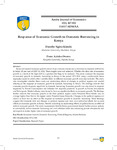Response of Economic Growth to Domestic Borrowing in Kenya
Abstract
Kenya envisioned economic growth rate of 10 per cent per annum and a reduction in domestic debt levels to below 25 per cent of GDP by 2012. These targets were not achieved. Whether the slow rate of economic growth is a result of the high debt is a question that begs to be analysed. This study analysed the response of economic growth to domestic borrowing in Kenya in the period 1971-2013 using a multivariate linear regression model in which other variables likely to influence economic growth were also included. The study also investigated whether there exists any moderating effects of changes in political regimes and market reforms on the response of economic growth to domestic borrowing in Kenya. The findings indicate that economic growth responds negatively to domestic borrowing. Economic growth was also found to respond negatively to Private Consumption and Inflation but responds positively to growth in Private Investments and Net exports. Market reforms were found to have no significant effects on economic growth. The findings further indicate that economic growth in the third political regime under President Mwai Kibaki was on average higher than that in the regime under President Jomo Kenyatta. Changes in the political regimes are shown to have had no effect on the response of economic growth to domestic borrowing. These findings suggest that domestic debt and changes in political regimes only have own individual effects but no joint effects on economic growth in Kenya, thereby indicating no moderating effects of political forces on effect of debt on economic growth. The study recommends that the Kenya government should further pursue policies to successfully reduce domestic borrowing and curb inflation while also enhancing private investments and net exports to realise higher rates of economic growth.

